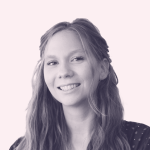
Omnichannel marketing – more than a buzzword
23 January 2024
Women and our health – let’s put real issues front and centre
23 January 2024
As long as I can remember, as a little girl my mother encouraged me to be me. I was the flamingo in the room – a flamingo among the swans. Yet I embraced being different and it was a good thing I did. As a Dutch girl in Midwest America in the 1980s, I was rare. Add to that, I have a rare blood disease called hereditary spherocytosis. It’s not particularly rare on the scale of ‘rareness’ but enough to make me different. It took a long time for me to realise that being different is okay. In fact, eventually, I had a sense of pride from being unique and, dare I say, maybe even a sense of power because I was given opportunities my friends weren’t. I realised that being rare and standing out could be good. That realization was down to 3 simple facts:
1) I knew my mum and grandmother also had my disease, so I was not alone. In fact, I felt strangely connected to them;
2) I was diagnosed at a very early age, meaning I could manage symptoms through my mother’s experiences, and I knew that my disease was not life-limiting;
3) I grew up with access to great healthcare – and sure enough when I needed that ambulance and blood transfusion, it was there (although let it be known as a Dutch girl living in Germany I did joke about what it would do to my orange blood – something that in the heat of urgency was not laughed at).
I am rare and lucky.
Being rare today does not always have to mean a life in isolation with negative outcomes. The world has made great advances with orphan drug research, treatment options and access programs. That said, not all of those living with a rare disease are able to reach for those better outcomes. Sometimes just due to circumstance.
Striving for equity
The gap between those who have a better opportunity to achieve good outcomes is particularly noticeable in rare diseases. The idea of achieving equity in healthcare is critical when what is normal for a handful is far being normal for so many others. The World Health Organisation says that ‘Health equity is achieved when everyone can attain their full potential for health’. Yet barriers still exist for many, from social inequalities to environmental factors. We have an opportunity – and a responsibility – to advance a conversation around equity and inclusion to create a better understanding and increased awareness. That’s where we in the agency world can help – by bringing together the stories of people living with rare diseases and highlight the human truth in these stories. It takes that human truth as the single unifying idea that connects us all. By bringing together patients, health professionals and industry to share these stories, we can create a launchpad for change.
Human Purpose – the Havas approach
At Havas, we have a way of addressing that single point that can connect us all in a meaningful way. We call it our Human Purpose and it is the link between great ideas, excellence in execution and why we do what we do. It may sound simple and that is why, in my opinion, it is so relevant – finding that human truth that connects to a sense of purpose that is bigger than an individual product or brand. It’s something that is meaningful to an audience, whether it is the prescriber, the patient, or the caregiver community.
With increasing pressure on the attention span of our audiences, it is when we connect, that we are heard. Finding that overarching purpose is so important in rare disease, where every story makes a mark.
Identifying the Human Purpose is the foundational reason why we care about rare disease. Eurordis demonstrates this in their approach to Rare Disease Day – by making the topic of equity and inclusion front and centre and connecting it to the wider community. It’s an example of how we can make an impact on the lives of people with rare disease – by looking for meaningful solutions. There is a pride and power in a shared purpose, especially in the case of rare diseases.
Be the rare flamingo

Having worked in rare diseases for many years, combined with my little speck of an experience, I know the impact of having a rare disease can be huge, both on the person themselves and the people who support them. The challenges they face can seem overwhelming and even isolating. That is why the community spirit of Rare Disease Day has such meaning.
So, to all the flamingos out there – this Rare Disease Day be the flamingo in the room. You stand for so much more than just what is seen on the outside. I am proud to stand with you and help continue the conversation of equity in healthcare, for people living with – and affected by – rare diseases.
And if being rare makes you feel like you are just one among many, remember that there is a community out there ready to make you feel rare and just like many.

